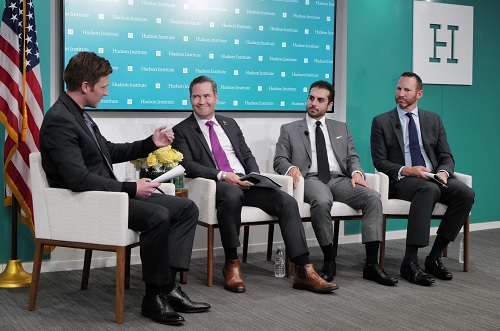Hudson Institute Debates America’s Best Options to Support NRF
By Elaine Pasquini
Photo by Phil Pasquini

Washington: Two years after the withdrawal of US-led troops from Afghanistan, the National Resistance Front of Afghanistan (NRF) continues to be the only credible and non-extremist armed opposition to the Taliban, but, unfortunately without any international support.
On September 19, 2023, the Hudson Institute hosted Ali Nazary, head of external relations for the NRF; Rep Mike Waltz (R-FL) an Army Special Forces veteran and former White House and Pentagon advisor; and Hudson Institute senior fellow Luke Coffey, to discuss the current state of resistance to the Taliban and America’s best options to support the NRF.
Moderator, Nolan Peterson, a nonresident senior fellow at the Atlantic Council, noted NRF’s 34-year-old leader Ahmad Massoud is the son of the legendary resistance leader Ahmad Shah Massoud – known as the lion of Panjshir – who was a leading mujahideen commander against the Soviets in the 1980s and leader of the Northern Alliance opposing Taliban rule until his assassination on September 9, 2001.
Opening the discussion, Nazary called Afghanistan a “ticking bomb.” He noted that today more than 20 terrorist groups, including ISIS and al-Qaeda, are operating in Afghanistan and “striving to destabilize the region and the globe.”
The recent cross-border attacks in Chitral, Pakistan in September and a foiled attack in Tajikistan are a “preview of what we are going to face in the region and beyond the region in the years to come as long as the Taliban are in power and providing a sanctuary for any radical jihadist group,” he warned.
The only democratic forces fighting against these terrorist groups, verified in a UN Security Council report a few months ago, is the National Resistance Front of Afghanistan, now based in Tajikistan, without any international support. “Basically, the policy we see in the international community is to appease the Taliban as much as possible as if appeasement will change the situation,” Nazary said. “The war on terror in Afghanistan has not ended. Just because politicians decided to leave Afghanistan doesn’t mean that the war ended. It’s continuing and we’re the only forces today continuing the fight against terrorism.”
Contrary to the belief of some governments that the Taliban will sever ties with terrorism, Nazary argued that it is important for Washington to “adopt a realistic policy based on the realities on the ground and start establishing communication and relations with those who are fighting for democracy and who are actually fighting against terrorism which we have proved to do so in the last two years.”
In 2022, a political process began in Vienna to unite the democratic forces of Afghanistan including civil society, opposition like the NRF, political parties and diplomats who have kept the doors of the embassies open and are refusing to pledge alliance to the Taliban. “The purpose of Vienna is to create a democratic alternative for Afghanistan’s future, for us to unite under one banner and to prepare for a democratic Afghanistan in the future,” he explained.
Coffey called the US-withdrawal from Afghanistan in 202l “a stain on our honor as Americans.” It emboldened US adversaries and made Washington’s allies question US resolve. What’s sad about the whole thing is that it was completely avoidable. President Biden, Coffey stated, could have withdrawn from President Trump’s agreement with the Taliban as he did with other Trump administration policies. “But the truth is he didn’t want to change it because he was never fully committed to the US mission in Afghanistan to begin with,” he argued.
Now, the NRF is “trying to pick up the ball where we dropped it with all of the cards stacked against them, trying to fight the Taliban and fight the Islamic State Khorasan Province, [and] other transnational terrorist groups and regional terrorist groups,” Coffey said.
In addition, the United States could have some form of observer role at the next Vienna meeting. “It pains me to say, but I don’t think we will see any fundamental change on the US approach to Afghanistan with this administration,” Coffey said. “But our legislative branch has the ability to make US foreign policy, certainly edit US foreign policy, so I think there are some opportunities there and I think the NGO and think tank civil society community can keep the drum beat going…and raise awareness of what’s going on so when the US government finally decides to get back in step with dealing with this problem at least we’re not starting from nothing.”
Waltz called the issue of Afghanistan a moral and strategic one and “one that is still squarely in the interests of the United States.”
Asked if the lack of a US presence in Afghanistan is a win for China and Russia, Waltz responded: “Yes, it was absolutely a win for China,” noting the $10 billion in mining deals that China’s new ambassador in Kabul was just boasting and bragging about and the fact there are multiple geological survey teams sitting in Bagram air base, which the US abandoned, to exploit Afghanistan’s rich mineral wealth and expand their Belt and Road Initiative.
In conclusion, moderator Peterson pointed out that a united Afghanistan was one of the most important ideas to the legendary leader Ahmad Shah Massoud, who said: “We’re not Pashtuns; we’re not Tajiks; we’re all Afghans.”
(Elaine Pasquini is a freelance journalist. Her reports appear in the Washington Report on Middle East Affairs and Nuze.Ink.)

